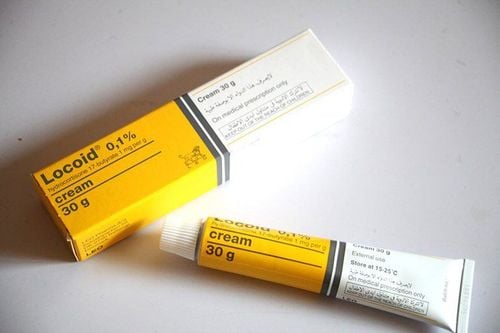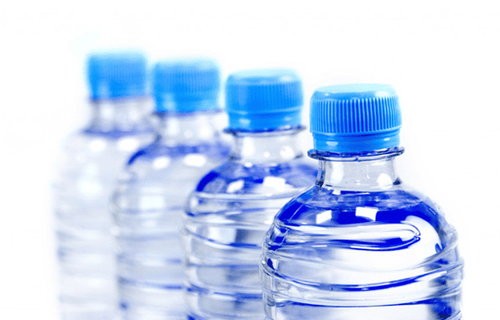This is an automatically translated article.
When your body loses a significant amount of water, the body will show symptoms of dehydration. Including symptoms of dehydration in the skin. This article helps provide symptoms of dehydrated skin to help you better understand the condition
1. What is dehydrated skin?
Dehydrated skin means your skin is lacking water. It can be dry and itchy and can also look dull. Your overall skin tone and complexion may be uneven, and wrinkles are more apparent.
While dehydrated skin can be frustrating, it's relatively easy to treat with the right lifestyle changes. Treatment starts from the inside out to replenish and maintain hydration throughout your body.
Dehydrated skin can get dry, but not dry skin types too. Severely dry and dehydrated skin should be addressed with a doctor.
2. Dehydrated skin and dry skin
Dehydrated skin is sometimes misinterpreted as dry skin. However, these are two different phenomena.
While dehydrated skin lacks water, dry skin lacks natural oils (also known as sebum). Also, dry skin is a skin type, while dehydration is considered a condition.
Skin types are classified as normal skin, dry skin, combination skin and oily skin. You are usually born with one skin type, but it can change with age and season. When you have dry skin, your sebaceous glands don't produce enough natural oils.
Your skin often needs help replenishing moisture through emollients to protect from further moisture loss. Dry skin can also be caused by underlying health conditions, such as hypothyroidism.
Hormonal conditions like these do not cause skin to become dehydrated. Signs of dry skin include:
Scaly skin Red and white scales Irritation Dry skin is sometimes associated with skin conditions like psoriasis, eczema, and even post-acne. However, these are not the same as this type of dry skin, nor are they the same with dehydrated skin.
By its definition, dehydration means that your body is losing more water than it is taking in. In addition to not drinking enough water, this may be related to increased urination due to caffeine or diuretics. It can also occur due to excessive sweating during exercise.

Da có vảy là dấu hiệu da thiếu ẩm cần được chăm sóc
Unlike dry skin, dehydration can cause the following symptoms:
Itching Dull skin Dark circles under eyes Darker sunken eyes Melasma around the face (especially under the eyes and around the nose) you) Increased incidence or appearance of lines and wrinkles on the surface Severe dehydration can go beyond your skin and cause symptoms such as:
Dizziness Dry mouth Blurred feeling light General feeling of weakness Darker and less frequent urination Dehydration can become a medical emergency in these cases. See a doctor immediately if symptoms of severe dehydration do not improve.
3. How to check if your skin is dehydrated or not?
You can perform a simple skin pinch test at home to determine your skin's hydration level.
Take a small part of the skin around the cheek area and gently rub it. If you notice any wrinkles and if your skin doesn't bounce back after you relax, your skin may be dehydrated.
A dermatologist or esthetician can also help you determine if your skin is dehydrated or dry.

Bạn có thể tự kiểm tra dấu hiệu da thiếu ẩm tại nhà
4. How to treat dehydrated skin
Unlike dry skin, dehydration is treatable with lifestyle changes. Staying hydrated is an important first step, so it's important that you drink plenty of water. You can start with the old rule of drinking eight glasses of water a day if you're not already drinking enough.
Depending on your body weight and activity level, you may need to drink more than this. Ask your doctor the right amount for you.
It is important not to drink too much water, as this can lead to mineral loss. Eating water-rich vegetables and fruits can also help increase your intake (think celery, watermelon, and the like).
You can also treat dehydrated skin with the following diet and lifestyle changes:
Drink alcohol in moderation (if at all). Drink less coffee and other sources of caffeine. Quit smoking. Exercise regularly. Drink water while exercising (The Nemours Foundation recommends taking several sips at least every 20 minutes). Replenish fluids after you exercise. Sleep a lot. Eat more plant-based foods, such as fruits, vegetables, and legumes. If you've been sick recently, dehydration may be related to dehydration due to illness. Make sure you're drinking plenty of water, electrolyte drinks, and broth-based soups.
Severe dehydration can be treated with intravenous fluids in a doctor's office or hospital.
On the other hand, dry skin is more difficult to treat. If your skin has always been naturally dry, you may need extra care to stay hydrated during cold and dry weather.
Dry skin moisturizer is key to hydrate your skin without making it too greasy. A moisturizer made for oily skin won't treat dry skin - in fact, it can make you break out. Drinking more water won't help with dry skin, it's also good for your overall health.
5. Dehydrated skin can be controlled
Dehydrated skin can be complicated, but it's treatable when you get the right diagnosis. Dry skin has similar symptoms but cannot be treated with dietary and lifestyle changes.
If your skin's dehydration doesn't improve after making these types of changes, you may actually have dry skin. See your dermatologist for more advice on how to properly treat dry skin.
Please dial HOTLINE for more information or register for an appointment HERE. Download MyVinmec app to make appointments faster and to manage your bookings easily.
Reference source: healthline.com












